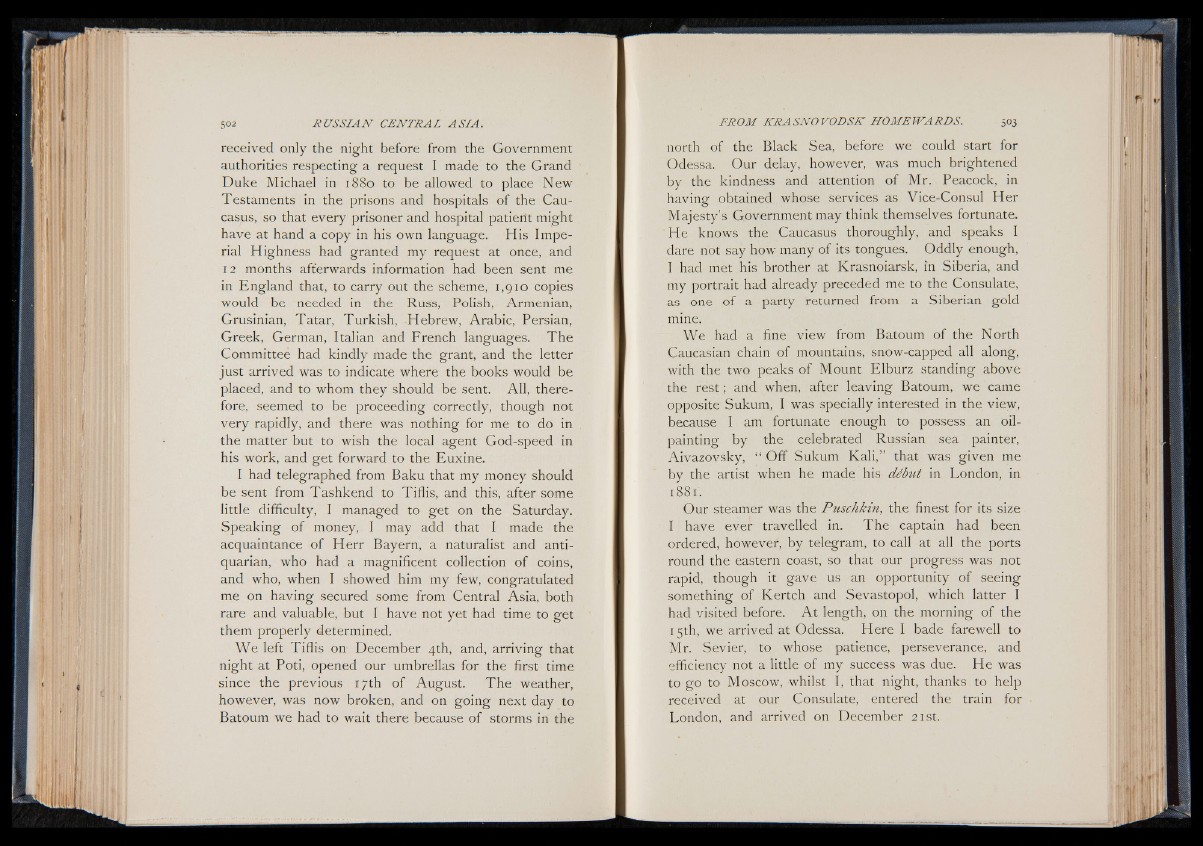
received only the night before from the Government
authorities respecting a request I made to the Grand
Duke Michael in 1880 to be allowed to place New
Testaments in the prisons and hospitals of the Caucasus,
so that every prisoner and hospital patierit might
have at hand a copy in his own language. His Imperial
Highness had granted my request at once, and
12 months afterwards information had been sent me
in England that, to carry out the scheme, 1,910 copies
would be needed in the Russ, Polish, Armenian,
Grusinian, Tatar, Turkish, Hebrew, Arabic, Persian,
Greek, German, Italian and French languages. The
Committee had kindly made the grant, and the letter
just arrived was to indicate where the books would be
placed, and to whom they should be sent. All, therefore,
seemed to be proceeding correctly, though not
very rapidly, and there was nothing for me to do in
the matter but to wish the local agent God-speed in
his work, and get forward to the Euxine.
I had telegraphed from Baku that my money should
be sent from Tashkend to Tiflis, and this, after some
little difficulty, I managed to get on the Saturday.
Speaking of money, I may add that I made the
acquaintance of Herr Bayern, a naturalist and antiquarian,
who had a magnificent collection of coins,
and who, when I showed him my few, congratulated
me on having secured some from Central Asia, both
rare and valuable, but I have not yet had time to get
them properly determined.
We left Tiflis on December 4th, and, arriving that
night at Poti, opened our umbrellas for the first time
since the previous 17th of August. The weather,
however, was now broken, and on going next day to
Batoum we had to wait there because of storms in the
north of the Black Sea, before we could start for
Odessa. Our delay, however, was much brightened
by the kindness and attention of Mr. Peacock, in
having obtained whose services as Vice-Consul Her
Majesty’s Government may think themselves fortunate.
He knows the Caucasus thoroughly, and speaks I
dare not say how many of its tongues. Oddly enough,
I had met his brother at Krasnoiarsk, in Siberia, and
my portrait had already preceded me to the Consulate,
as one of a party returned from a Siberian gold
mine.
We had a fine view from Batoum of the North
Caucasian chain of mountains, snow-capped all along,
with the two peaks of Mount Elburz standing above
the rest ; and when, after leaving Batoum, we came
opposite Sukum, I was specially interested in the view,
because I am fortunate enough to possess an oil-
painting by the celebrated Russian sea painter,
Aivazovsky, “ Off Sukum Kali,” that was given me
by the artist when he made his début in London, in
1881'.
Our steamer was the Puschkin, the finest for its size
I have ever travelled in. The captain had been
ordered, however, by telegram, to call at all the ports
round the eastern coast, so that our progress was not
rapid, though it gave us an opportunity of seeing
something of Kertch and Sevastopol, which latter I
had visited before. A t length, on the morning of the
15th, we arrived at Odessa. Here I bade farewell to
Mr. Sevier, to whose patience, perseverance, and
efficiency not a little of my success was due. He was
to go to Moscow, whilst I, that night, thanks to help
received at our Consulate, entered the train for
London, and arrived on December 21st.